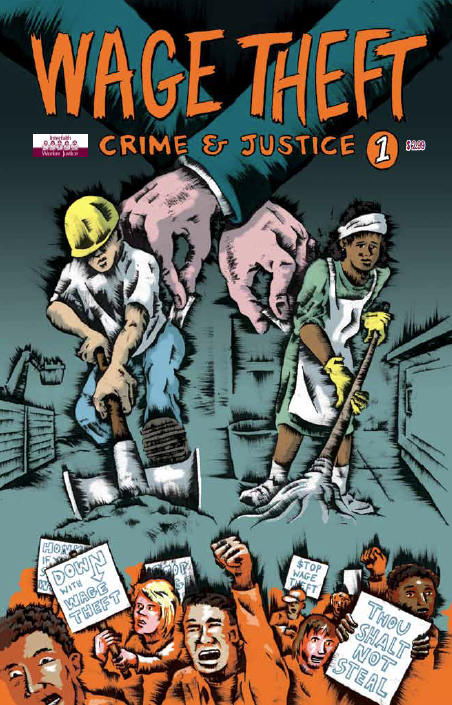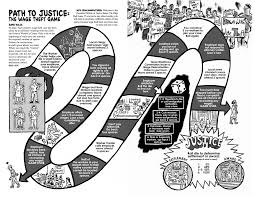In the wake of the Bangladesh Factory collapse/massacre, the plight of vulnerable workers around the globe has been on the front page. Pope Francis rightly named the evil of slave labor which underpins the inexpensive consumer goods and record profits enjoyed in the United States and elsewhere. It is important to remember as well that such conditions exist in the shadows of the United States as well. Are we protecting workers? Are we guaranteeing them safe working conditions? fair wages? Over the last few weeks, I have signed petitions and called my elected representatives on a number of worker justice issues.* In New York, this has involved a failed attempt at passing a bill protecting the human rights of migrant farm workers. The bill, which passed the assembly but not the Senate (I am embarrassed to say that my own elected representative led the campaign against bringing it to a vote in the house) would have:
• Establish an 8 hour workday for farmworkers
• Provide farmworkers overtime pay of at least time and one half after 8 hours of work
• Allow farmworkers one day of rest each week, which they may decline
• Require that farmworkers are paid the minimum wage
• Prohibit child farmworkers from being paid a wage lower than the minimum wage
• Give farmworkers the right to organize and bargain collectively for the purposes of representing and protecting their interests
• Ensure that farmworker housing facilities meet basic standards under the Sanitary Code, including: structurally safe buildings, clean water, adequate light and ventilation, and facilities for sewage disposal
• Provide farmworkers with unemployment pay when laid off from work or terminated
• Require employers to provide workers’ compensation benefits to farmworkers who are injured during the course of employment
One common myth surrounding the situation of NY farmworkers is that they are already have these protections. They do not.
Farmworkers are excluded from key labor protections under both federal and state law. For example, the Fair Labor Standards Act and the National Labor Relations Act protect workers’ right to overtime pay and to collective bargaining, but both laws have specific exemptions for farmworkers. The New York State Constitution unequivocally states that all employees shall have the right to organize and bargain. However, like the federal laws, the New York State Labor Relations Act excludes farmworkers from this protection and other fundamental labor protections. Because of these exclusions, farmworkers do not have the right to a day of rest, to overtime pay, to organize and bargain collectively, and other labor rights that other workers consider fundamental.
This is why there are currently major farmworker protection efforts going on around the country. Many federal and state labor laws exclude agriculture. In California, oversight of protections in overwhelming heat will protect the lives of many working in the fields (after a lawsuit was brought for non-enforcement last year.) In December, the migrant worker division of Colorado Legal Services submitted a complaint to the United Nations concerning violation of migrant workers human rights.
Among the litany of abuses, wage theft is often atop the list for both farm workers and domestic workers. What is wage theft?
~ignoring minimum wage laws ~charging employees for safety equipment and the time spent putting on and off ~ stealing tips ~ignoring overtime laws.
According to Interfaith worker justice, 80% of the workers who come into their centers for help are victims of wage theft. Wage Theft: Crime & Justice, produced by Interfaith worker justice, notes that in a 2009 study, of 4,387 low wage workers interviewed 43.6% of them experienced wage theft in the year before. Who are the most vulnerable? Farm workers, construction, retail salespersons and tellers, apparel and textile workers, building maintenance workers, cafeteria workers, meat processing, waiters and waitresses, bartenders, domestic workers and housekeepers, dry cleaning workers, beauty workers. Undocumented workers are significantly more vulnerable (higher wage theft) than documented or citizens, but it occurs to all three.
“The average worker lost $51 per week, out of $339 in earnings. This translates into $2,634 annually, 15% of their true annual earnings of $17,616. If that worker was to work a 40 hour week, the first 6.67 hours would be unpaid.”
Imagine the difference $2,600 would make for low wage workers and their families?
Another example of wage theft is found in this week’s headlines, where a woman is suing McDonald’s for requiring wages be paid by debit card (involving fees) rather than her request direct deposit.
Natalie Gunshannon, a single mother, 27, said she and other workers were paid through a JPMorgan Chase Payroll Card, which has a $1.50 fee for ATM withdrawals, a $10 inactivity fee after 90 days, and a 75 cent online payment fee per transaction and other fees.
The issue in Gunshannon’s case (which I suspect will result in others coming forward) is not payment by debit card. For those without bank accounts, the fees associated with the debit card may be significantly less than a check cashing facility and provide greater security. The problem, however, is in requiring a worker to accept those fees as opposed to direct deposit into one’s bank account. Social Security and many states now offer a debit card option for benefits; however, the Social Security card comes with the following guarantee;
There is no sign-up fee and no monthly account fee. Many other services are provided free of charge, including:• Purchases at retail locations, cash back with purchases, or
cash withdrawals through bank or credit union tellers; • One ATM cash withdrawal for each deposit posted to your account each month when using a Direct Express® card network ATM. Without the option of direct deposit, Gunshannon rightfully claims wage theft. There is a broader justice question concerning the terms of the JP Morgan Chase payroll card being issued to McDonald’s workers in Pennsylvania….but that is an investigation for another day. (To learn more about wage theft: a report by the discount foundation detailing not only abuses but successful suits to recover lost wages.)
What can we do to combat wage theft ? Start by finding the local Interfaith Worker Justice or similar committee within your community or state. For resources: Interfaith Worker Justice has a fantastic comic and educational game based upon efforts in Houston to help guides us to a path towards justice….
*I want to note that the scandal of sexual assault in the US Military (see: Invisible war) and sexual assault of migrant farm workers exposed this month on Frontline (Rape in the Fields) are worker justice issues as well….but that is the subject of another post.





Thank you for your on-going witness to all of this Meghan. The callousness with which some approach these matters, is startling to me. And all the while, at the other end of the spectrum, CEO pay goes up up up. It is not just.